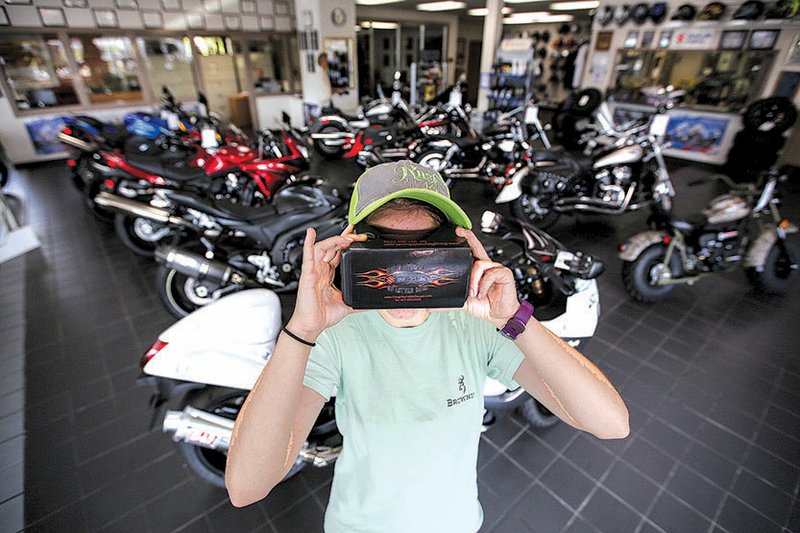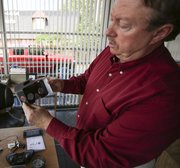At a family-owned motorcycle and all-terrain vehicle dealership in Little Rock with five full-time employees, virtual reality viewers have become as commonplace as the vehicles on the showroom floor.
Doug Reynolds Suzuki said it was the first business in Arkansas to decide to deploy this technology for widespread marketing purposes. But this is not the only place in Arkansas you can find virtual reality equipment these days.
John Harvey is a longtime client of Troy and Charlotte Reynolds, the business' sibling co-owners, and does marketing work for them. About a year ago, he began looking into virtual reality and how it could help his clients. He pitched the idea to the Reynoldses and has since rebranded his own business as Bottom Line Virtual Boost, LLC.
By December, the dealership had 500 customized Google Cardboard head-mount viewers to give potential customers. Google originally developed the device as a low-cost way to make virtual reality accessible to anybody with a smartphone. All users need to do is set the phone inside the viewer with a special virtual reality video or photo playing on the phone. YouTube has a whole channel dedicated to them.
"If you come in and you're interested in a vehicle that we have, we are more than happy to take a picture or video of it with you, give you a device to take home and you can look at the vehicle at your home," Harvey said.
"Show your wife or kids or friends, 'This is what I'm looking at, this is what I'm thinking about buying,'" Troy Reynolds said. "It's like you are right here in the showroom."
The $5 devices cost about the same as brochures from the manufacturer, Charlotte Reynolds said. Unlike a brochure, though, the viewer provides a means to unlimited personalized content. Besides, brochures are on the way out, she said.
"[Manufacturers] are already replacing brochures with the internet. They very seldom send us brochures and when they do they are very expensive."
"In sales, to give them this instead of just a piece of paper is a lot better deal," Troy Reynolds said. "This is something tangible. They can see themselves on the bike."
MAKING THE SALE
The technology helps customers make a decision, especially for motorcycle sales, Charlotte Reynolds said.
"I know this really big guy who will sit on every bike and ask, 'Does this look like it fits me?' But now he can look at the video and see, 'Oh, it really does or doesn't fit me.'"
The Reynoldses believe the viewers have made a difference. "For the short time we've had it, we can tell the customers really think it's a neat thing. It's a lot better than a brochure. They can put their friends and family in the room. It's like they are right here," Troy Reynolds said.
Lagena Brown of Hot Springs was shopping for a four-wheeler for her husband and left the dealership with a virtual reality viewer. "I think they are getting customers in by offering the virtual glasses," she said. "I think it's a really good idea."
While they might have been the first Arkansas business to give away Google Cardboards, the Reynoldses are certainly not the only people in Arkansas thinking about virtual reality.
A few miles away at the University of Arkansas at Little Rock lies a world-class virtual- and augmented-reality research facility.
Augmented reality is the integration of digital information with the user's environment in real time. Unlike virtual reality, augmented reality superimposes images on top of the the user's view.
RIGHT HERE AT HOME
Carolina Cruz-Neira, director of the Emerging Analytics Center, is known internationally as one of the pioneers of virtual reality. The Arkansas Research Alliance recruited her to the state in 2014.
"We have probably one of the most complete virtual reality and augmented reality facilities in the nation right now, because we have one or two of everything that is out there," Cruz-Neira said.
"Here under our roof you can see the $10 virtual reality and augmented reality technology all the way to the $10 million technology and everything in the middle. That makes us very, very unique."
Cruz-Neira knows of no other business in Arkansas using virtual reality like Doug Reynolds Suzuki.
"The concept of what John [Harvey] has done with Doug Reynolds is a perfect example," she said. "It's simple. It's inexpensive and it goes on everybody's cellphone. That is extremely effective, specifically in this context with the marketing they needed."
She said that before companies deploy any of this technology, it's important that they understand what their options are and match them to their goals.
"I think the first step is trying to find somebody that is reputable in the field and then explore what makes sense for whatever marketing campaign they are trying to do," Cruz-Neira said. "Are they trying to provide an experience of using the product, like the Doug Reynolds example? Or are they trying to provide information about the product or the company and maybe its mission or values?"
Many companies approach the center looking for help and advice in integrating the technology into their businesses. Her team has worked with the automotive industry, military operations and architecture and heavy construction firms, to name a few.
"Some of them want to learn to eventually do it themselves internally and some of them are happy to have us as a partner where they focus on their expertise, and they use us as supplemental expertise when they need it," she said. "We do it both ways."
CLASSROOM KITS
Cruz-Neira said augmented reality is an important component of the field as well. For a recent Sun Belt championship basketball game, her team developed a mobile application that enabled University of Arkansas at Little Rock Trojan fans to take photos with virtual representations of the team's players.
"Virtual reality and augmented reality are a significant portion of the future as far as computer science is concerned," Cruz-Neira said. "So having skills in this area is going to be very critical."
In recognition of this, Gov. Asa Hutchinson has included it in his prioritization of computer science and technology education. As a result, Facebook launched its nationwide TechStart campaign in Arkansas by donating 500 Oculus Rift virtual reality classroom kits to 250 Arkansas schools in January. The social media giant bought virtual reality startup Oculus in 2014.
At the time of the donation, Erin Egan, vice president of U.S. public policy for Facebook, explained why they had chosen Arkansas: "We looked around the country in which states were really interested in bringing computer science to the classroom," she said. "Gov. Hutchinson has been a leader there, and so it was natural for us to pick Arkansas as the first state for us to launch this TechStart initiative."
Cruz-Neira agreed that Hutchinson's commitment to computer science and technology has been very important.
"I think Gov. Hutchinson and his office have done a great job providing a vision of where they see the state going," Cruz-Neira said. "That was exciting enough for Facebook to come in here and say, 'Hey we're going to help you. Here is our initial commitment to help in this.' That was fantastic."
SundayMonday Business on 05/14/2017

